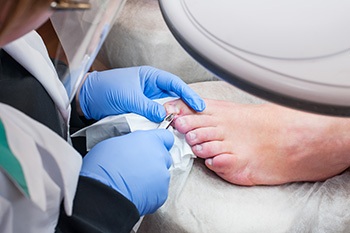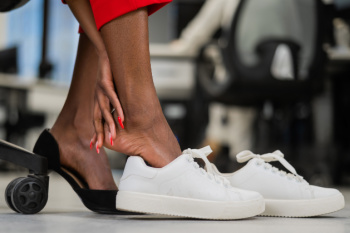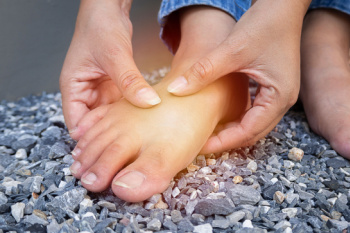Items filtered by date: July 2024
Surgical Procedure for an Ingrown Toenail

An ingrown toenail, a common and often painful condition, may require surgical intervention when conservative treatments fail to provide relief. The surgical procedure, known as partial nail avulsion, involves numbing the toe with a local anesthetic. Once numb, the podiatrist carefully removes the portion of the toenail that is ingrown, ensuring to leave the healthy nail intact. In some cases, the nail bed may also be treated to prevent future ingrowth. The procedure is typically quick, taking only a few minutes, and patients can often return home the same day. After surgery, it is essential to keep the toe clean and dry, following any post-operative care instructions provided by the podiatrist. If you have an ingrown toenail that is causing you chronic pain and discomfort, it is suggested that you consult a podiatrist who can determine if this type of surgery is right for you.
Foot surgery is sometimes necessary to treat a foot ailment. To learn more, contact the foot specialists of Spartan Podiatry. Our doctors will assist you with all of your foot and ankle needs.
When Is Surgery Necessary?
Foot and ankle surgery is generally reserved for cases in which less invasive, conservative procedures have failed to alleviate the problem. Some of the cases in which surgery may be necessary include:
- Removing foot deformities like bunions and bone spurs
- Severe arthritis that has caused bone issues
- Cosmetic reconstruction
What Types of Surgery Are There?
The type of surgery you receive will depend on the nature of the problem you have. Some of the possible surgeries include:
- Bunionectomy for painful bunions
- Surgical fusion for realignment of bones
- Neuropathy decompression surgery to treat nerve damage
Benefits of Surgery
Although surgery is usually a last resort, it can provide more complete pain relief compared to non-surgical methods and may allow you to finally resume full activity.
Surgical techniques have also become increasingly sophisticated. Techniques like endoscopic surgery allow for smaller incisions and faster recovery times.
If you have any questions please feel free to contact our offices located in Battle Creek, and Marshall, MI . We offer the newest diagnostic and treatment technologies for all your foot and ankle needs.
Do You Suffer From Painful Feet?
How Serious Is My Heel Pain?

Heel pain can be debilitating, affecting daily activities and mobility. Common causes include plantar fasciitis, Achilles tendonitis, and heel spurs. Symptoms often manifest as sharp or dull pain in the heel or underside of the foot, especially noticeable after periods of rest. Effective treatment strategies include exercises to alleviate discomfort and reduce inflammation. Wearing proper footwear with adequate support and cushioning can also provide relief. Accurate diagnosis by a podiatrist is key for targeted treatment plans. So, if heel pain persists or worsens over time, it is wise to seek professional advice from a podiatrist. Their specialized knowledge ensures you receive comprehensive care and personalized treatment to address the root cause of your discomfort effectively. Don't let heel pain sideline you, and consider scheduling an appointment with a podiatrist for expert guidance and relief.
Many people suffer from bouts of heel pain. For more information, contact the foot specialists of Spartan Podiatry. Our doctors can provide the care you need to keep you pain-free and on your feet.
Causes of Heel Pain
Heel pain is often associated with plantar fasciitis. The plantar fascia is a band of tissues that extends along the bottom of the foot. A rip or tear in this ligament can cause inflammation of the tissue.
Achilles tendonitis is another cause of heel pain. Inflammation of the Achilles tendon will cause pain from fractures and muscle tearing. Lack of flexibility is also another symptom.
Heel spurs are another cause of pain. When the tissues of the plantar fascia undergo a great deal of stress, it can lead to ligament separation from the heel bone, causing heel spurs.
Why Might Heel Pain Occur?
- Wearing ill-fitting shoes
- Wearing non-supportive shoes
- Weight change
- Excessive running
Treatments
Heel pain should be treated as soon as possible for immediate results. Keeping your feet in a stress-free environment will help. If you suffer from Achilles tendonitis or plantar fasciitis, applying ice will reduce the swelling. Stretching before an exercise like running will help the muscles. Using all these tips will help make heel pain a condition of the past.
If you have any questions please contact our offices located in Battle Creek, and Marshall, MI . We offer the newest diagnostic and treatment technologies for all your foot and ankle needs.
Tips for Finding Shoes That Fit Properly

Surprisingly, about 70 percent of people wear shoes that don’t fit well, leading to discomfort and potential long-term issues affecting the feet and ankles, as well as other body parts. To ensure a proper fit, start by measuring your feet, as sizes can vary between brands and your feet change over time. Shop in the afternoon when your feet are slightly swollen, ensuring a fit that accommodates daily activity. Look for shoes with adequate support and structure, avoiding overly soft footwear that lacks stability. Check for a thumb’s width of space at the toe and consider the shape of the shoe to avoid cramped toes. Heels higher than 1.5 inches can worsen foot problems. For those on carpets or with mobility issues, lightweight polyurethane soles are a better option than heavy rubber. Breathable materials and appropriate socks are also important to prevent moisture buildup and subsequent issues, like corns or blisters. Special features can accommodate specific conditions like diabetes, bunions, or hammertoe. For personalized advice and to address any foot-related concerns, it is suggested that you make an appointment with a podiatrist.
Finding a properly-fitting shoe is important in reducing injuries and preventing foot problems. For more information about treatment, contact the foot specialists from Spartan Podiatry. Our doctors will treat your foot and ankle needs.
Proper Shoe Fitting
A common concern when it comes to foot health, having properly fitted shoes can help prevent injuries to the foot. Out feet affect our posture and gait, which in turn affects the biomechanics and overall bodily structure. With 33 joints, 26 bones, and over 100 ligaments, the potential for serious injury is much greater than one realizes. Although the feet cease growth in adulthood, they still change shape as they mature. Here are some factors to consider when it comes to investing in proper fitting shoes:
- Be sure the shoes fit correctly right away
- Ensure the ball of your foot fits comfortably in the widest portion of the shoes
- Even though they may look fashionable, improper fitting shoes can either create adverse conditions or exacerbate existing ones you may already have
- Walk along a carpeted surface to ensure the shoes comfortably fit during normal activity
Keeping in mind how shoes fit the biomechanics of your body, properly-fitting shoes are vitally important. Fortunately, it is not difficult to acquire footwear that fits correctly. Be sure to wear shoes that support the overall structure of your body. Do your feet a favor and invest in several pairs of well-fitted shoes today.
If you have any questions please feel free to contact our offices located in Battle Creek, and Marshall, MI . We offer the newest diagnostic and treatment technologies for all your foot and ankle needs.
Foot Conditions That May be Linked to Thyroid Disease
 Thyroid disease can lead to various foot conditions that impact daily comfort and mobility. Cracked heels are a common issue, resulting from dry skin associated with an underactive thyroid. Itchy feet may also occur due to the same dryness and reduced circulation. Cold feet are another symptom, as thyroid disorders often lead to poor blood flow. Swelling in the feet and ankles can arise from fluid retention linked to thyroid imbalance. Additionally, foot cramps are frequent due to disrupted electrolyte balance and nerve function. These symptoms highlight the need for thyroid management and regular foot care. Moisturizing regularly, wearing supportive footwear, and monitoring foot health can alleviate discomfort. If you suffer from a thyroid disorder and have problematic foot conditions, it is suggested that you consult a podiatrist who can offer you effective relief and treatment options.
Thyroid disease can lead to various foot conditions that impact daily comfort and mobility. Cracked heels are a common issue, resulting from dry skin associated with an underactive thyroid. Itchy feet may also occur due to the same dryness and reduced circulation. Cold feet are another symptom, as thyroid disorders often lead to poor blood flow. Swelling in the feet and ankles can arise from fluid retention linked to thyroid imbalance. Additionally, foot cramps are frequent due to disrupted electrolyte balance and nerve function. These symptoms highlight the need for thyroid management and regular foot care. Moisturizing regularly, wearing supportive footwear, and monitoring foot health can alleviate discomfort. If you suffer from a thyroid disorder and have problematic foot conditions, it is suggested that you consult a podiatrist who can offer you effective relief and treatment options.
When dealing with systemic disease of the feet, it is extremely important to check the affected areas routinely so that any additional problems are caught quickly. If you have any concerns about your feet and ankles contact the foot specialists from Spartan Podiatry. Our doctors will assist you with all of your podiatric needs.
Systemic Diseases of the Feet
Systemic diseases affect the whole body, and symptoms usually are displayed in the feet. This condition can make a patient’s ability to walk unbearable. Systemic diseases include gout, diabetes mellitus, neurological disorders, and arthritis.
Gout – is caused by an excess of uric acid in the body. Common symptoms include pain, inflammation, and redness at the metatarsal/phalangeal joint of the base big toe. Gout can be treated by NSAIDs to relieve pain and inflammation, and other drugs that lower the acid levels in the body.
Diabetes mellitus – is an increase in the level of blood sugar that the body cannot counteract with its own insulin. Failure to produce enough insulin is a factor in Diabetes.
Diabetes of the Feet
Diabetic Neuropathy – may lead to damaged nerves and affect the feet through numbness and loss of sensation.
Peripheral Vascular Disease – can restrict the blood flow to the feet, and often times lead to amputation of the feet.
If you have any questions please feel free to contact our offices located in Battle Creek, and Marshall, MI . We offer the newest diagnostic and treatment technologies for all your foot and ankle needs.
Understanding Pediatric Gout

Pediatric gout, although rare, is a form of arthritis that affects children and is characterized by the accumulation of uric acid crystals in the joints. This condition can cause sudden and severe pain, swelling, redness, and warmth in the affected joints, most commonly the big toe. Symptoms may also include fever and limited joint movement due to intense discomfort. Risk factors for pediatric gout include genetic predisposition, obesity, and certain medications. Medical conditions that affect uric acid metabolism, such as leukemia or kidney disease, are other risk factors. Early diagnosis is essential for effective management, which typically involves medication to reduce uric acid levels and inflammation, along with lifestyle modifications like a balanced diet and maintaining a healthy weight. If your child has periodic, but intense, toe or foot pain, it is strongly suggested that you consult a podiatrist who can accurately diagnose, treat, and manage gout.
Gout is a painful condition that can be treated. If you are seeking treatment, contact the foot specialists from Spartan Podiatry. Our doctors will treat your foot and ankle needs.
What Is Gout?
Gout is a form of arthritis that is characterized by sudden, severe attacks of pain, redness, and tenderness in the joints. The condition usually affects the joint at the base of the big toe. A gout attack can occur at any random time, such as the middle of the night while you are asleep.
Symptoms
- Intense Joint Pain - Usually around the large joint of your big toe, and it most severe within the first four to twelve hours
- Lingering Discomfort - Joint discomfort may last from a few days to a few weeks
- Inflammation and Redness -Affected joints may become swollen, tender, warm and red
- Limited Range of Motion - May experience a decrease in joint mobility
Risk Factors
- Genetics - If family members have gout, you’re more likely to have it
- Medications - Diuretic medications can raise uric acid levels
- Gender/Age - Gout is more common in men until the age of 60. It is believed that estrogen protects women until that point
- Diet - Eating red meat and shellfish increases your risk
- Alcohol - Having more than two alcoholic drinks per day increases your risk
- Obesity - Obese people are at a higher risk for gout
Prior to visiting your podiatrist to receive treatment for gout, there are a few things you should do beforehand. If you have gout you should write down your symptoms--including when they started and how often you experience them, important medical information you may have, and any questions you may have. Writing down these three things will help your podiatrist in assessing your specific situation so that he or she may provide the best route of treatment for you.
If you have any questions, please feel free to contact our offices located in Battle Creek, and Marshall, MI . We offer the newest diagnostic and treatment technologies for all your foot care needs.

